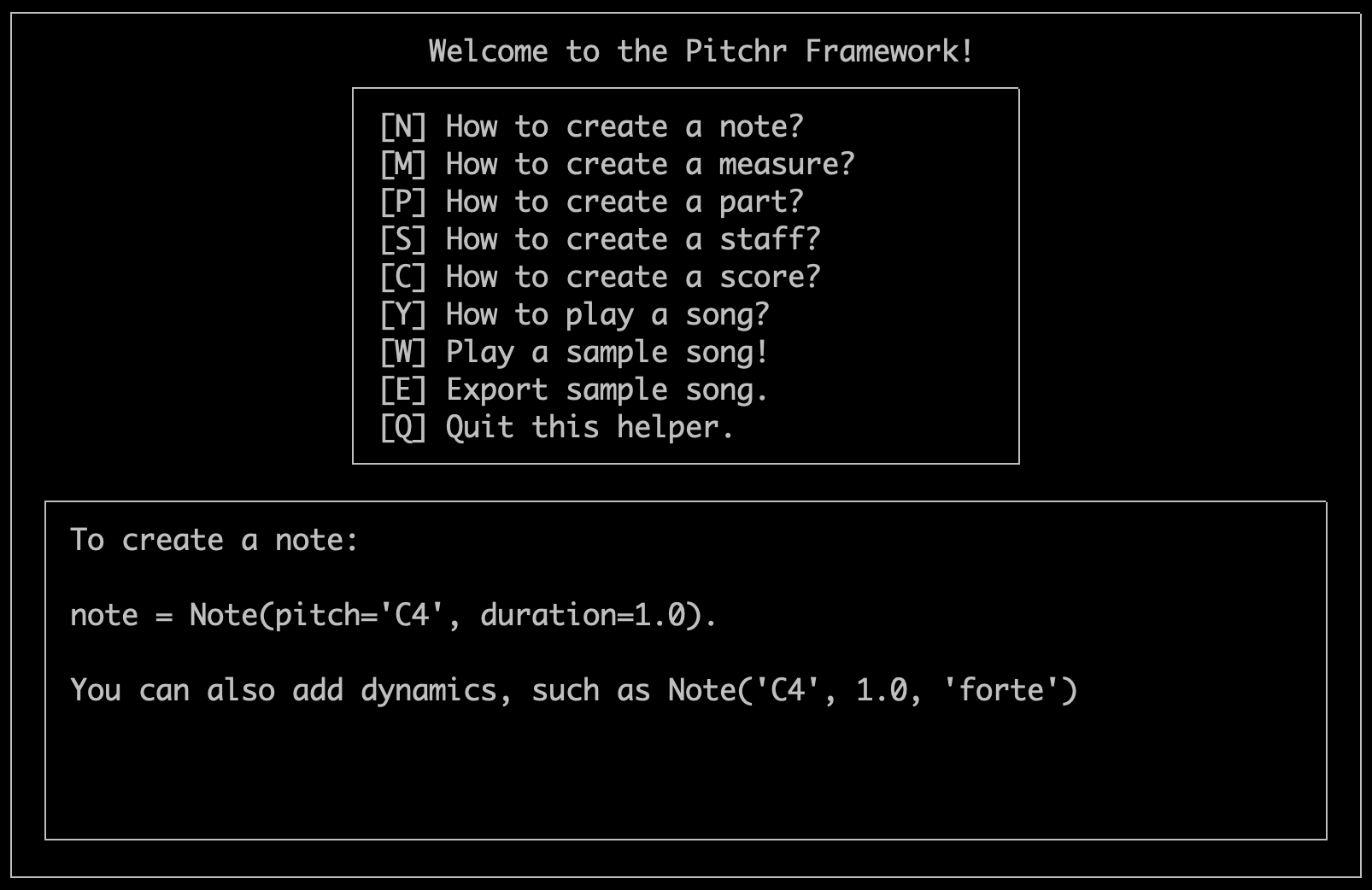Pitchr
A python library and framework for composing music. Pitchr on PyPI
Targets most Linux environments.
Features
- Enables creation of music by composition of music objects (notes, chords, measures, and staffs)
- Unified interface for playing any music object (
note.play(),staff.play()) - Unified interface for showing any music object (
note.show(),staff.show())- Spawns an image of the music object
- Unified interface for exporting any music object (
note.save('note.pdf'),staff.save('staff.pdf')) - Flexible manipulation of music
- easily access notes by indexing a measure by beat:
note0 = measure[0] - edit note attributes' pitch via methods
transpose,octave_up,augment
- easily access notes by indexing a measure by beat:
- Intelligently generates harmonies from your melodies
- Finalizes your composition as beautiful standard sheet music
- Enables interactive development in Jupyter Notebook
Installation
To install: pip3 install pitchr.
Other dependencies that must be installed (available via your package manager):
- libasound2
- lilypond
Pitchr downloads models to ~/.pitchr/. Set the PITCHR_PATH environment variable to change this behavior.
Documentation
Documentation is hosted on Github Pages here
Getting Started
from pitchr import *
# Instantiate notes
n = Note(pitch='C4', duration=1.0)
# Play them
n.play()
# Write music
m = Measure([
Note('C', 1.0),
Note('D', 1.0),
Note('E', 1.0),
Note('D', 1.0),
])
# See what you've written
m.show()
# Export to PDF
m.save('MySong.pdf')Helper UI
To access the helper UI, run from the command line: python3 -m pitchr.helper

More Detailed Notes

Note() class
Init:
pitch("C#6")durationin beatsdynamic(piano, forte, crescendo)articulation(staccato, accent, fermata)
Note()
from pitchr import *
note1 = Note("C4", 1, "forte")
note1.mingus_note # 'C-4'
note1.duration # 1
note1.dynamic # "forte"
note1.augment() or note1.diminish()Chords
note2. = Note("E4", 1)
chord1 = Chord([note1, note2])
chord1.determine() # "Major third"Measure is a collection of Notes
measure1 = Measure([note1, note2])
measure1.contains(note1) # True
measure1.append(note3)Staff is a collection of Measures
Init:
measuresclefvoicehttps://thedpws.github.io/pitcher/
staff1 = music.Staff(measure1, Clef.TREBLE, Voice.PIANO)Part is a collection of Staffs
part1 = Part(staff1, tempo, time_signature, key_signature)
part1.add_staff(staff2)
part1.time_signature = 3/4Score is a collection of Parts
score1 = Score("My Song", "Wonderful Subtitle", "Author Me", "me@email.com")
score1.get_author() # "Author Me"
score1.get_title() # "My Song"
score1.add_part(part1)Harmony generation
from pitchr.harmony_maker import build_harmony
my_melody = Staff(my_measures)
my_harmony = build_harmony(my_melody)
my_harmony.play()Running all Pitchr tests
./run_pitchr_tests.shContributing
Setting up dependencies
- python3.8 is required for pitchr and python3 should link to python3.8 to run the tests
ln -s /usr/bin/python3.8 /usr/bin/python3- To create the virtual environment,
cdinto the project directory andpython3 -m venv env - To install dependencies to the virtual environment,
source env/bin/activate && pip3 install -r requirements.txt - Install these dependencies using your local package manager (ex.
sudo apt install python3-dev python3-venv libasound2 libasound2-dev lilypond):python3-devpython3-venvlibasound2libasound2-devlilypond
Working on the project
- Before working, activate the environment by
source env/bin/activate - Deactivate by
deactivate